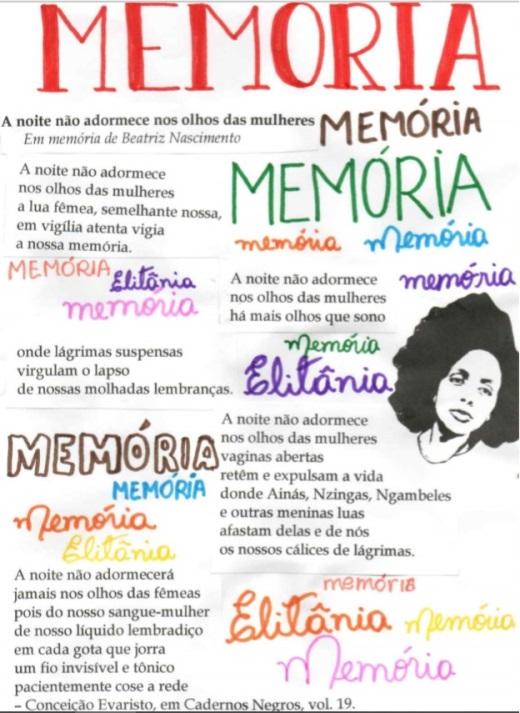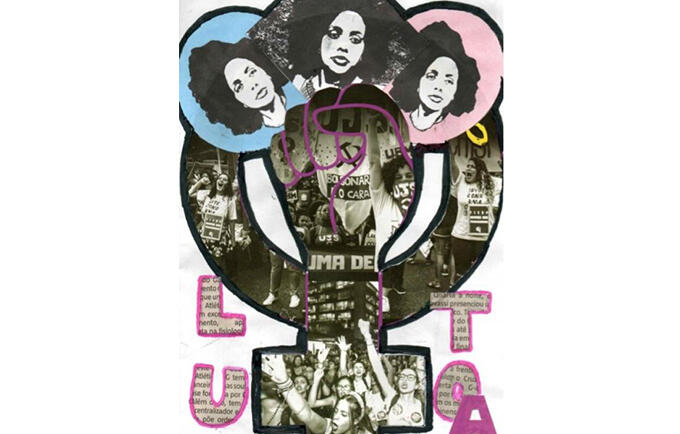A social work student and human rights activist had her life interrupted. UNFPA and UN Women mourned the loss
December 10, 2019, Salvador, Bahia, Brazil - Elitânia de Souza da Hora. Determined, intelligent, master of herself. A promising life that was suddenly interrupted at 25 years old. The human rights activist and leader of the Quilombola Community from Tabuleiro da Vitória, in Cachoeira, a municipality in Bahia's recôncavo, she was a tireless person in defense of the most disadvantaged. On Wednesday, November 27, the girl was a victim of a violent crime, suspected of femicide, at the entrance of the Universidade Federal do Recôncavo da Bahia (UFRB), where the Bahian studied and inspired colleagues and teachers.
The loss moved Brazil. The United Nations Population Fund (UNFPA) and UN Women have issued a call to end violence against women. “This crime, and the many femicides that robbed women of ther lives that came before, show us how urgent is to intensify efforts and invest in prevention of violence against women. In 2018, 1.206 women were femicide victims -- about 61% of them were black women and 52,3% of the total murders were by gunfire, ” emphasized the note from data from the 13th Edition of the Brazilian Yearbook of Public Security, released in October. by the Brazilian Public Security Forum. In 88.8% of the cases, the perpetrator was the victim's partner.
Resistance reference
“We want to remember Elitania not from her death, or as a victim of femicide, but from her history. And we will fight for the maintenance of her memory ”, highlights Lucas Ribeiro, from the National Movement of Quilombola Students, in criticism of the approaches and narratives constructed by the media about cases of violence suffered by women. Beside Elitânia, he sought to guarantee the rights of young quilombolas in the recôncavo. “Black woman, militant, empowered. If we had mobilization, she was with us. If we had something to work out, she was there. I spent nine months without a student scholarship and she strengthened me. Elitania is a reference of resistance ”.
Elitania was the example of a young woman who understood her rights. She had no children, encouraged women in her communities (university and quilombola) to decide the best choices for their lives, and encouraged them to study. According to classmate Raquel Alves and one of her best friends, the social work student fought against all forms of discrimination and oppression.
“The fact that I'm indigenous and she was a quilombola made us have similar struggles, but each one with its own specificities. Eli was a positive person and always said: 'we are the hope'. From our people, from our elders. And this phrase has kept me strong, ”she remembers. The young woman from the Jenipapo-Kanindé indigenous community alongside Elitania and other colleagues formed the “Cahl Causadoras” group, in reference to student activism within the Center for Arts, Humanities and Letters from Universidade Federal do Recôncavo da Bahia (UFRB).

According to Denize Ribeiro, professor, activist of the black women's movement, and a member of Negras - Center for Gender, Race and Health Studies from UFRB, “a society that allows violence such as that suffered by Elitania, is not a safe place to be a woman and to develop her full potential”. She tells the process of empowerment of Elitania in the institution. “She listened to us and tried to get out of that abusive relationship. She came to university and took on tasks such as student and quilombola leadership. She worked as best she could and devoted herself to her studies. She has been becoming black over time. She grew and flourished, but it was all brutally torn away, not only from her, but from all of us with her death. She was interrupted by machismo. ”
Denize also emphasizes that girls and women should be whatever they want to be, but in a violent society, they become victims with their trajectories changed. “Institutional and structural machismo is a major barrier in women's lives and development. Many women are prevented from studying, working, going out for fun, having a different religion from other family members, growing up without the threat of being raped by family members, having the profession they want, having children whatever they want, to date anyone they want, not to meet the heteronormative pattern, to wear the clothes they like and even dream about another reality. ”
The educator's statement dialogues with the State of World Population Report 2019 (SWOP), entitled “Unfinished Business: the pursuit of Rights and Choices for All”. The report show us taht, “of all obstacles to the achievement and exercise of human rights, including reproductive rights, few have proven to be as difficult to overcome as those based on gender, and that this kind of inequality limits women's ability to freely make fundamental decisions about when and with whom they want to have sex; the use of contraception or access to health care; and if and when to look for a job or to pursue higher education”.
Written by Midiã Noelle



